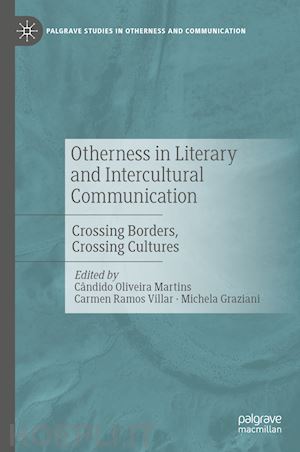
Questo prodotto usufruisce delle SPEDIZIONI GRATIS
selezionando l'opzione Corriere Veloce in fase di ordine.
Pagabile anche con Carta della cultura giovani e del merito, 18App Bonus Cultura e Carta del Docente
Looking at both Lusophone literature and literatures from around the globe from the perspective of intercultural communication, this book addresses post-colonial literature, intercultural negotiations, and how multicultural debates are reflected in literary production. Topics addressed include mobility and its effects, be it through work, business, leisure, travel, or study; contact between countries, even within the boundaries of the country itself; migration or exile, be it by choice or by force. As a whole, the volume provides a comparative study of representations of intercultural communication in literature. The volume conceives literature broadly to include both traditional fictional and non-fictional prose, and more recent genres like social media posts
1. Introduction.- Part 1: Crossing towards the Other.- 2. The Return of Julia Mann to Paraty, by Teolinda Gersão: the self, the other and the other-self.- 3. Travelling beyond idiosyncratic beliefs.- 4. The other is us: from the shadow of the past to the projection of the future.- 5. Representation of and Academic Reflection on Borders in The Other Stories Exhibition.- 6. Difference and the other: considerations on ethics and politics in the context of the arts.- 7. Folding and unfolding the other in Anne Carson’s Nox.- Part 2: Postcolonial and contemporary considerations on otherness.- 8. Regimes of otherness in As duas sombras do rio, by João Paulo Borges Coelho.- 9. The Complexities of Solitude and Absence: voices and Narratives of Multiple Others within Portuguese Post-Coloniality.- 10. Migration, identity/alterity, trauma in post-colonial Mozambique: the Madgermanes between narrative and comics.- 11. Djaimilia Pereira de Almeida’s “Bruma” and the Specters of 19th Century Portuguese Realism.- 12. Postcolonial legacies in contemporary portuguese literature: novels by Djaimilia Pereira de Almeida.- 13. Rethinking nationality in Latin-America: otherness in epic narratives.- 14. Themes of ‘othering’ in the team's story – self-identity of Moroccans soccer team’s.- 15. Community Segregation on Social Media–Notion of Othering in Virtual World .- 16. Othering, coloniality and xenophobia on Black South African Twitter.- Part 3: Differences and multiplicities of otherness.- 17. Lyrical poetry in medieval galician-portuguese: crossing traditions.- 18. Transformation through Transculturation in Chen Xi’s Comics.- 19. A Portuguese embassy to China (1725-1728) between the affirmation of one's own identity and the incomprehension of otherness.- 20. Listening Otherwise, Crossing Cultural Divides: Thanhhà L?i’s Listen, Slowly.- 21. Senna Fernandes: the identity multiplicity from Macao.- 22. Overcoming Otherness. Polish accounts from 19th century travels to Portugal .- 23. Hospitality: guests and pests.
Cândido Oliveira Martins is Associate Professor at the Catholic University of Portugal and holds a PhD in Humanities (Theory of Literature). He is a researcher in Literature and Culture Studies at the Centre for Philosophical and Humanistic Studies (CEFH). Most recently he was co-editor of the books: Masks and Human Connections: disruptive Meanings and Cultural Challenges (Palgrave Macmillan, 2023); The Power of the Image in the Work of Lídia Jorge (Peter Lang, 2023).
Carmen Ramos Villar has mainly published on Portuguese American life writing, and on the theme of emigration in literary works produced by authors from the Azores islands and from the Azorean-American community. Her latest publications include 'El adulterio como estrategia narrativa en Equador (2003), de Miguel Sousa Tavares.' MOARA – Revista Eletrônica do Programa de Pós-Graduação em Letras (64):141-159, and 'Storying the "I" of community, or how the community is shaped by stories in José Francisco Costa’s Mar e tudo.' Gávea-Brown—A Bilingual Journal of Portuguese-North American Letters and Studies 46:106-120.
Michela Graziani is Associate Professor of Portuguese Literature at the University of Florence (Italy). She obtained a PhD in Macanese Literature and a master in Eastern Comparative Philosophies. Her research activity mainly focuses on Eastern philosophical aspects in Lusitanian literature and on Portuguese literature of the modern age connected with the Italian culture of the same time. She is co-director of the series Studi linguistici e letterari tra Italia e mondo iberico in età moderna together with Salomé Vuelta García (Florence, Olschki publisher). Her last publication: Il Settecento portoghese e lusofono (2023), edited by Firenze Univ. Press.











Il sito utilizza cookie ed altri strumenti di tracciamento che raccolgono informazioni dal dispositivo dell’utente. Oltre ai cookie tecnici ed analitici aggregati, strettamente necessari per il funzionamento di questo sito web, previo consenso dell’utente possono essere installati cookie di profilazione e marketing e cookie dei social media. Cliccando su “Accetto tutti i cookie” saranno attivate tutte le categorie di cookie. Per accettare solo deterninate categorie di cookie, cliccare invece su “Impostazioni cookie”. Chiudendo il banner o continuando a navigare saranno installati solo cookie tecnici. Per maggiori dettagli, consultare la Cookie Policy.